A turbulent past as well as a chaotic present describes the country of Afghanistan perfectly.
 Humans have been living in and around Afghanistan's region for at least 50,000 years. It has been suggested that the area was home to some of the earliest farming communities in the world.
Humans have been living in and around Afghanistan's region for at least 50,000 years. It has been suggested that the area was home to some of the earliest farming communities in the world.
It was invaded and conquered (over the centuries) by the Persians, Greeks, Arabs, Mongols, Tartars and British. Today the country is deeply involved in America's on-going worldwide war on terrorism.
During the 7th century AD, Arab Muslims brought Islam to Afghanistan, turning the region into the primary focal point of the Muslim world. By the 11th century the remaining non-Muslim areas had all adopted Islam.
The Mongol barbarians and Genghis Khan stormed through Afghanistan in the year 1219 annihilating cities and villages along the way. The Mongols dominated the region, driving the locals to rural societies, until the Timurid dynasty took control in 1370.
By the 16th century, and lasting until the early 18th century, Afghanistan fell under the rule of three regional kingdoms: Khanate of Bukhara in the north, Shi'a Safavids in the west, with the remaining area was controlled by the Delhi Sultanate.
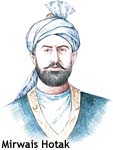 The Afghan citizens began to grow restless under their leadership, and in 1709 a successful revolt headed by Mirwais Hotak (widely recognized as Afghanistan's George Washington) overthrew the Persians.
The Afghan citizens began to grow restless under their leadership, and in 1709 a successful revolt headed by Mirwais Hotak (widely recognized as Afghanistan's George Washington) overthrew the Persians.
In 1722, Mirwais Hotak's son Mahmud took an army with him to Persia, eradicated the capital of Isfahan, and he declared to be King of Persia.
Naturally, this displeased the citizens of Persia, and they refused to align with the new Afghan rulers. After the massacre of thousands, a battle between the Persians and Afghans developed, and in 1729 the Persians pushed out the Hotaki dynasty.
Ahmad Shah Durrani was appointed head of state in 1747, and has since become recognized as the founder of the modern state of Afghanistan. Along with the Afghan army, Durrani was responsible for conquering the entirety of present-day Afghanistan, as well as Pakistan, the Khorasan and Kohistan provinces of Iran, and Delhi inIndia.
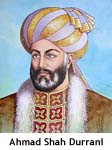 Following Durrani's death in 1772, his son, Timur Shah Durrani, assumed control of the region, and transferred the capital from Kandahar to Kabul in 1776.
Following Durrani's death in 1772, his son, Timur Shah Durrani, assumed control of the region, and transferred the capital from Kandahar to Kabul in 1776.
Instability surfaced in the early 1800s as the Sikhs in the east and the Persians in the west threatened the Afghan Empire. The Persians were successfully held back, but the Sikhs defeated Afghan's present ruler, Fateh Khan, at the Battle of Attock.
Prior to the invasion, Fateh Khan had divided 21 of his brothers in ruling positions throughout the empire, and after his death the brothers divided the provinces between themselves.The First Anglo-Afghan War (widely known as the Great Game) occurred in 1839 as the Afghan army surrounded Sikh forces at Jamrud. It was basically a competition for power and influence over Central Asia fought between theBritish and Afghanistan. This first war was followed by a second in the late 1870s, and then a third in the early 1900s.
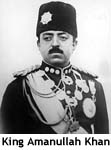 After the signing of the Treaty of Rawalpindi in 1919, Afghanistan was declared fully independent, and King Amanullah Khan moved forward in establishing diplomatic relations and modernizing the country.
After the signing of the Treaty of Rawalpindi in 1919, Afghanistan was declared fully independent, and King Amanullah Khan moved forward in establishing diplomatic relations and modernizing the country.Some of King Amanullah Khan's reforms were met with resistance by tribal and religious leaders, especially the abolishment of the burqa for women and co-educational schools. The king abdicated in 1929 after forces invaded Kabul.
Afghanistan's new king, Nadir Shah, completely threw out Amanullah Khan's reforms in an attempt to slowly approach the modernization of the country.
During World War II and the Cold War, Afghanistan remained neutral, and caught the attention of both the Soviet Union and the United States, as both countries competed for building rights to Afghanistan's highways and airports.
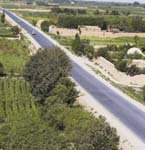 The newly built infrastructure brought an influx of western travelers throughout the 1960s, as the highways opened for use.
The newly built infrastructure brought an influx of western travelers throughout the 1960s, as the highways opened for use.In 1973, Daoud Khan organized a coup against King Zahir Shah, and became Afghanistan's first President.
The Soviet Union invaded Afghanistan in December of 1979. Through the 1980s this brutal war with Russia caused over a million Afghanis to lose their lives, and when the Russianswithdrew in 1989, they subsequently left the country in a turmoil of refugees and poverty.
Internal fighting continued between varied mujahidin factions, giving rise to a state of warlordism that eventually spawned the Taliban. Their brutal control and social oppression ended whenU.S. and allied military forces invaded the country shortly after the attacks on the United States on September 11, 2001.
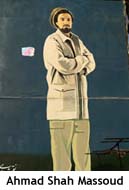 Two days before September 11, 2001, Ahmad Shah Massoud, an Afghan war hero responsible for leading troops in driving the Soviets out of Afghanistan, was assassinated by suicide bombers.
Two days before September 11, 2001, Ahmad Shah Massoud, an Afghan war hero responsible for leading troops in driving the Soviets out of Afghanistan, was assassinated by suicide bombers.Even with the new government and the recent democratic election, Afghanistan's future is still very uncertain, especially with America's continuing war on terrorism, and its battles with the remaining followers of Usama (Osama) Bin Laden.
After the May 2011 death of Osama bin Laden, many of Afghanistan's prominent figures (including Mohammed Daud Daud, Ahmad Wali Karzai, Jan Mohammad Khan, Ghulam Haider Hamidi, Burhanuddin Rabbani and others) were assassinated, and Pakistani-Afghan border conflicts intensified.
In response to the increased tension, NATO launched "Operation Knife Edge" against the Haqqani network in southeastern Afghanistan as an attempt to help eliminate insurgents before they strike.
Travel to Afghanistan is strongly discouraged as the ability of Afghan authorities to maintain order and ensure the security of citizens and visitors is limited.
No comments:
Post a Comment